Analysis: Kathy Scruggs, Truth, Fiction and Clint Eastwood’s ‘Richard Jewell’
Inside a packed advance screening held at the Rialto Center for the Arts in downtown Atlanta on Tuesday night, director Clint Eastwood unveiled his latest drama, “Richard Jewell,” just a few blocks away from Centennial Olympic Park. The film, depicting the Olympic Park bombing and its aftermath in the summer of 1996, was shot on location here this summer. Eastwood’s directorial perspective was vividly displayed on screen as attendees entered the theater where they were greeted by a black and white photo of the cast running a gauntlet of press with the words “The World Will Know His Name And The Truth.”
As Georgia Speaker of the House David Ralston introduced Eastwood, the audience gave the Hollywood icon a standing ovation. Joining the director on stage was actor Paul Walter Hauser, the actor who powerfully portrays Jewell in the drama, Kathy Bates, who has been nominated for a Golden Globe for her role of Richard Jewell’s mother, Bobi Jewell, Sam Rockwell, who portrays real-life Jewell attorney Watson Bryant and Jon Hamm, who plays FBI agent Tom Shaw, a fictional composite character in the film.
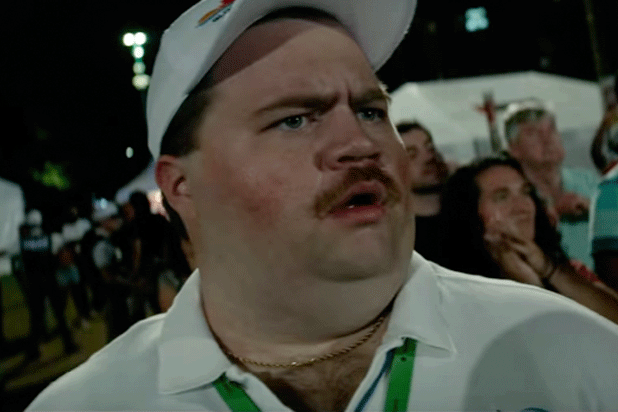
“This is a project that I’ve chased for a few years,” Eastwood told the crowd, calling Richard Jewell’s false identification as the Olympic Park bombing suspect and the FBI and the media’s role in the case “one of the great American tragedies I’ve seen in my lifetime.” Said Eastwood: “This is a chance to straighten that out as far as we know historically.” Eastwood then introduced the real Bobi Jewell, calling her, “perhaps the most important person here tonight.” In turn, Jewell told the director, “I’m a Jewell but he is also,” adding that her son (who died at age 44 in 2007) was looking down on the director. Eastwood then brought out the real-life Watson Bryant and his wife Nadya, who served as Bryant’s steadfast assistant as he represented Jewell in 1996.
As one of the dozens of Atlanta Journal-Constitution reporters working the Centennial Olympic Games in the summer of 1996, it’s impossible for me to be objective about “Richard Jewell.” But I can say this: Clint Eastwood has made a compelling and gripping film. The screenplay by Billy Ray is based on the February 1997 Vanity Fair magazine story, “American Nightmare: The Ballad of Richard Jewell” by Marie Brenner and the well-researched new book “The Suspect: An Olympic Bombing, The FBI, The Media And Richard Jewell, The Man Caught In The Middle” by Kent Alexander, the U.S. Attorney for the Northern District of Georgia in 1996 and Kevin Salwen, the Wall Street Journal reporter and editor who ran the paper’s southeastern section during the games.
The film’s most riveting moments recreate the horror of the 30-pound pipe bomb (planted inside a backpack by Eric Rudolph) going off in Centennial Olympic Park during a concert on the AT&T stage on July 27, 1996 and Jewell’s heroics in not only identifying the bomb but moving people out of harm’s way, saving countless lives.
As a reporter who helped to cover the swarm of global humanity in the city of Atlanta that summer, sitting through the film’s bomb sequence, shot inside the real Centennial Olympic Park earlier this summer and set-designed to look as it did in July of 1996, was harrowing. To Eastwood’s considerable credit, even though filmgoers know precisely what’s going to happen, we’re still on the edge of our seats as the tension mounts.
A great deal has already been written about my former AJC colleague Kathy Scruggs (who died in 2001 at age 42) and her work with AJC reporter Ron Martz on the Atlanta Journal front page story reporting that the FBI considered Richard Jewell a suspect. I vividly remember standing in the Features Department on the eighth floor of the AJC at 72 Marietta Street, just down the street from the nail pockmarked park, holding the Atlanta Journal EXTRA edition with Scruggs and Martz’s front page story with the headline “FBI Suspects ‘Hero’ Guard May Have Planted Bomb,” freshly delivered from the printing presses downstairs, staring in stunned silence alongside my co-workers.
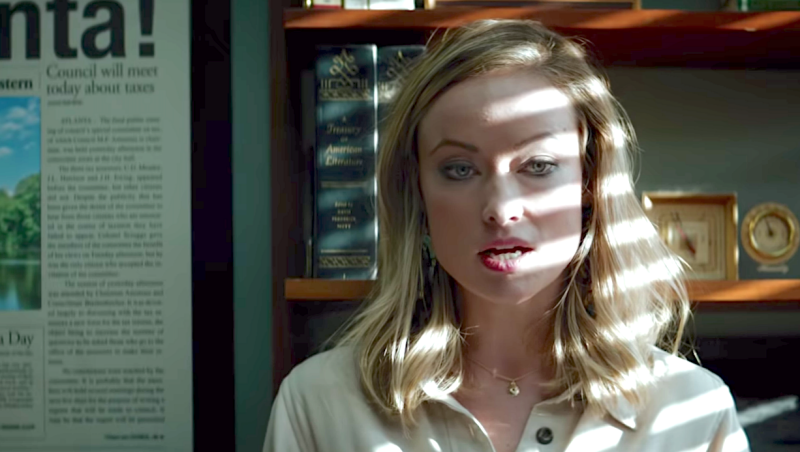
The controversial scene (shot at Johnny’s Hideaway, incidentally) that’s become national news this week (after the AJC sent a letter to Warner Bros. and Eastwood, demanding a disclaimer be added to the film’s credits) featuring Wilde’s portrayal of Scruggs, offering to “get a room or go back to my car” with Hamm’s FBI character in exchange for a lead on who the FBI’s suspect is, remained intact in the version of the film screened Tuesday night. In response to the AJC demand, Warner Bros. has defended its depiction of events, stating, “the film is based on a wide range of highly credible source material.”
Other scenes involving Scruggs where the screenplay appears to take dramatic liberties include a powerful but invented sequence where Rockwell’s Watson Bryant and Jewell himself show up unannounced in the AJC newsroom to demand a retraction and end up confronting Scruggs. Wilde tells Rockwell it’s her job “to report the facts.” Rockwell as Bryant’s reply: “The facts? What about the truth? Do you have any idea the wildfire you started? You call yourself a reporter? You’re a goddamn parasite.” At Tuesday night’s screening the line earned a smattering of applause from those in attendance at the Rialto.
In reality, it was Jewell attorney Lin Wood who sent the AJC a letter demanding a retraction, which is the first step necessary in order to file a libel suit, which was eventually filed against the AJC’s parent company Cox Enterprises in January 1997. The AJC was the only media outlet not to settle with Jewell for its reporting naming him as an FBI suspect. In 2012, the Georgia Supreme Court upheld a previous court ruling dismissing the lawsuit.
On the night of the bombing, there’s a scene of the Kathy Scruggs character arriving on the scene in the early morning hours and meeting up with her AJC colleague Ron Martz (played by David Shaw). Olivia Wilde as Scruggs then begins to say a prayer: “Whoever did this, please God, let us find him before anyone else does. And let him be [expletive] interesting. Amen.”
The film also depicts Scruggs stowing away in the back seat of Bryant’s car while he’s inside the Jewell apartment having a conversation with his client as a swarm of reporters circle the parking lot. When Scruggs pops up and tries to get Bryant to go on the record with her, he orders her from the vehicle. Scruggs reluctantly exits the car.
Later, during Kathy Bates’ Bobi Jewell’s emotional press conference, when she pleads with then-President Bill Clinton to clear her son, Scruggs is depicted as one of the reporters taking in the scene, clearly moved by Jewell’s defense of her son and wiping away tears.
Scruggs is also portrayed making the walk from the downtown bank of pay phones (where Eric Rudolph made the 911 call to tell authorities he had planted a bomb in the park) to the AT&T concert stage and realizing Jewell couldn’t have made the call and also made it back to the park in the allotted time frame, saying to herself, “He didn’t do it. [Expletive].” In reality, AJC reporter Bill Rankin made the walk from the bank of phones at the Days Inn downtown to the park and wrote the story in a co-byline with Ron Martz.
The film’s dramatic climax, meanwhile, gives Paul Walter Hauser an emotionally powerful Oscar nomination-tailored monologue to deliver that feels especially poignant and timely in 2019 as our nation continues to debate the role of whistleblowers in our society.
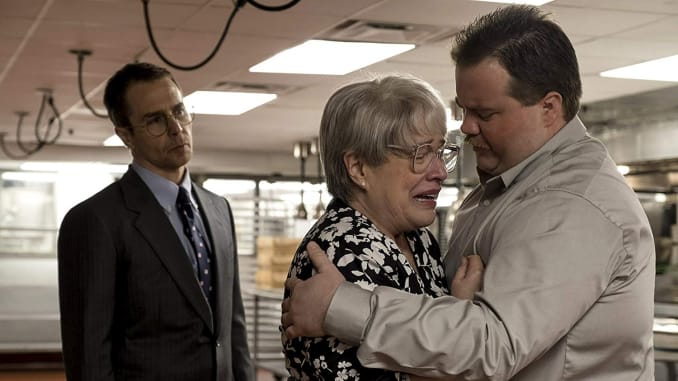
Atlanta audiences should go into the film this weekend expecting to see a powerful drama but as its marketing materials make clear, one that is “based on the true story of the 1996 Atlanta bombing.” It isn’t a documentary. On stage Tuesday night, Georgia Speaker of the House David Ralston announced plans to unveil a plaque in Centennial Olympic Park next March honoring Jewell.
With “Richard Jewell,” Clint Eastwood has created a potent conversation starter about the role and the responsibilities law enforcement and the media have in our society. In our currently polarized nation, depending on which political foxhole we choose to entrench ourselves, each profession is now considered either a demon or a deity. In our 2019 reality, where FBI agents are routinely labeled corrupt deep state operatives and any reporting we disagree is considered “fake news,” with little wiggle room in between for the truth, it’s a conversation well worth having with one another.
Above photograph: Georgia Speaker of the House David Ralston introduces Clint Eastwood, Paul Walter Hauser, Kathy Bates, Sam Rockwell and Jon Hamm at the Atlanta premiere of “Richard Jewell” on Tuesday, Dec. 10, 2019 at the Rialto Center for the Arts downtown.
“Richard Jewell,” the new drama shot in Atlanta, directed by Clint Eastwood and starring Sam Rockwell, Kathy Bates, Olivia Wilde, Jon Hamm and Paul Walter Hauser opens in theaters on Friday.

Richard L. Eldredge is the founder and editor in chief of Eldredge ATL. As a reporter for the Atlanta Journal-Constitution and Atlanta magazine, he has covered Atlanta since 1990.

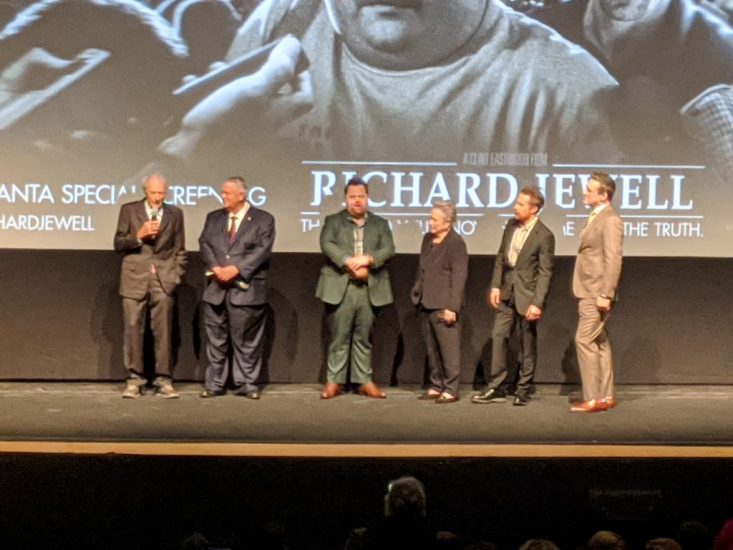

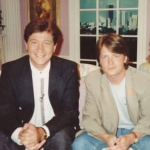

Kevin
December 11, 2020 @ 2:08 pm
This actually seems like good karma. Scruggs led the charge heavily insinuating (to avoid libel) that Jewell did the bombing and ruining the reputation of a hero, and she is depicted in a negative light so that way she is always remembered as the evil person she is
‘Richard Jewell’ movie was filmed at Oglethorpe, Johnny’s Hideaway, other local spots - Reporter Newspapers
December 13, 2019 @ 12:52 am
[…] Oglethorpe University to Johnny’s Hideaway, a popular Buckhead nightclub where Eastwood reportedly shot an already notorious scene suggesting a reporter offered an FBI agent sex for the Jewell […]